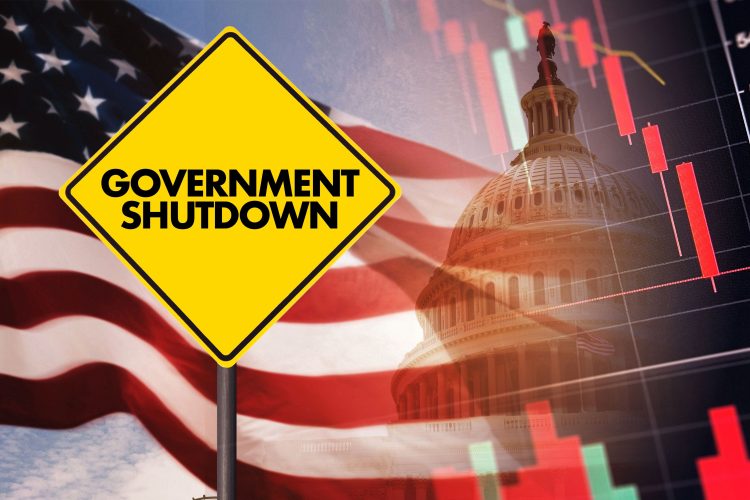As the government shutdown reaches day 14, the future remains uncertain. Although the Senate is set to reconvene today to vote on a Republican short-term spending measure, the fact that this is the eighth vote on the matter with little movement on stances from lawmakers has left much to be desired in terms of a quick resolution.
As this shutdown shapes up to rival some of the longest in history (the current record being 34 days in President Trump’s first term), the effects it could have on the housing market as it continues are worrying.
Despite just having reached two weeks, the shutdown is already affecting the housing market, specifically in the greater Washington, D.C., area.
“There’s a very stark chilling effect on the D.C.-specific housing market. Pretty dramatic pullback in new pending sales and showings like buyer traffic, really pretty significant pullback in buyer traffic,” says Bright MLS Chief Economist Dr. Lisa Sturtevant. “I’ve been tracking the five-week rolling average since that’s kind of when the National Guard deployed. Like I said, double-digit drops.”
“The Washington, D.C., housing market is more exposed to the government shutdown than anywhere else in the country, given the region’s deep ties to federal employment and contracting,” she adds.
Sturtevant also noted that nationally, the combination of lapses in the National Flood Insurance Program (NFIP) and slowed processing times at the IRS and elsewhere will create many complications, reflections of the ones seen in D.C. on a larger scale.
“I don’t know if we’ve seen it in the data yet, but the implications would be a much slower pace of being able to get through the financial hoops necessary to buy a home, which could put a drag on transactions,” she said.
Sturtevant says locally in D.C., the housing market’s uncertainty began with the DOGE layoffs, many Federal employees close to retirement or who were laid off were starting to list their homes at a higher rate. She noted that while this created more inventory, the question of buyers available to purchase has been in the air.
The deployment of the National Guard advanced the uncertainty and unease of the market, with the shutdown now continuing to further the issue.
This is something Thai Hung Nguyen—an agent and broker with Better Homes and Gardens Real Estate Premier operating in D.C., Maryland and Virginia—has observed firsthand as well.
“This week and potentially in the coming week as well, I do feel that more buyers are staying a little bit more cautious with their decision,” he said. “They are more reluctant to make any major changes. I have more buyers who want to wait and see, even though financially they did not get affected. Of course, for those buyers who are federal employees, they are more nervous.”
Despite buyer apprehension, Nguyen added that there has also been more exploration from potential sellers into taking their first steps due to their uncertainty on remaining in the area.
Beyond just the D.C. market, the shutdown carries effects to the housing market on a national level, specifically in mortgage processes and the NFIP.
As Pete Carroll, executive of Public Policy and Industry Relations at Cotality, noted, “NFIP lapses create problems because buyers are unable to obtain coverage before closing, and owners face delays in processing claims if a shutdown drags on.”
He continued by saying that while the GSEs, HUD, VA and other programs shouldn’t see major interruptions, their speeds will definitely be slowed as well.
Carroll added that “there’s no free lunch here.”
“As we’ve noted, some homebuyers are likely already experiencing the immediate efforts from a government shutdown,” he continued. “And the longer the shutdown is prolonged, the more homebuyers, particularly low- to moderate-income, will lose out on home-buying opportunities.”
If the shutdown continues into future days and weeks, as touched upon by Sturtevant, Nguyen and Carroll, the consequences will continue to grow.
The near future
While shutdowns don’t typically have a longstanding economic impact, Sturtevant said this one is different for a few reasons.
“One is that this shutdown is occurring as the overall regional economy and the national economy is slowing,” she explained. “People who are feeling uncertain about their jobs, and now on top of that we’re having to shut down. Then of course, the rhetoric around pretty massive cuts to staff, and then the rhetoric around not getting back pay. That could have a very significant impact on the housing market and could force more people to leave the region that would otherwise want to.”
As for the D.C. area, Sturtevant predicts home prices coming down year-over-year.
“I don’t think we’re talking double-digit price declines, but I do think we are going to see prices come down as inventory is just growing really quickly and that demand is going to be really slow as people are still uncertain about where the economy’s going,” she said.
Nguyen agreed that if the shutdown prolongs, there may be an increase in inventory for the D.C. area, but for sellers to see any buyers, investors will probably need to step up to the plate.
“In terms of buyer demand, it’s hard to say because it really depends on if the investors are willing to step up and take over some of these good deals,” he continued. “In terms of the homebuyer in general, including investors, second homebuyers or even amateur investors, I have the feeling they may jump me in the market when the price starts to make some adjustment.”
Nguyen added that if anything, this is a time for agents and clients to be connecting, and for agents to be stepping into that advisor role.
“A good or great agent should be able to give clients good advice in terms of whether or not whatever decision they make would fit well into their family situation.”












